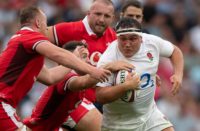 The action of the RFU Council in overturning their nominations panel's choice of president for the 2015 World Cup is probably their most significant in years. Nominations had chosen the established traditional candidate of John Spencer, Yorkshire's representative, who is a former England player and an experienced council man who would have done a very good job of dealing with the pomp that will surround the many official events at a World Cup.
The action of the RFU Council in overturning their nominations panel's choice of president for the 2015 World Cup is probably their most significant in years. Nominations had chosen the established traditional candidate of John Spencer, Yorkshire's representative, who is a former England player and an experienced council man who would have done a very good job of dealing with the pomp that will surround the many official events at a World Cup.
However, John like all of us who played for England between 15 to 40 years ago is of little or no relevance to the modern players or the general public, whereas the Council chose one of the best known rugby players of the modern generation.
The Council's choice of Jason Leonard is both exciting and brave and shows a far better understanding than most would have given them credit for, re how the game should be presenting itself at the 2015 World Cup if it is to achieve a meaningful legacy.
It is exciting because Jason will be the youngest president ever to represent the Union and he will also be the first World Cup-winning player to be host president at the event, the significance of which cannot be overstated.
Most sport governing bodies are tarred with the brush of being out of touch with those that take part, too old to understand the demands of the modern game, or as a bunch of ‘old farts' pontificating from on high – but that charge can no longer be levelled at the RFU.
It is also a brave step by Jason as his credibility as a man of the people will be partially on trial.
Jason has good grassroots recognition so many will be expecting him to use the powerful role of the presidency to improve the lot of those clubs particularly when it comes to the legacy.
Contrary to most of what comes out of Twickenham, life at grassroots level is not particularly good at the moment. In fact, it's incredibly tough.
While the Union do help clubs with interest-free loans for some projects they no longer give any direct funding to grassroots clubs.
Even the RFU's own 2012 annual report showed that allocations (payments) to the professional game went up by about £2.25m while grassroots rugby saw £100,000 taken away from cup competitions, thus reducing the RFU contribution to zero.
Much of the funding that goes to grassroots comes from government sponsored schemes through Sport England, with the Union generally providing only help in accessing those funds.
One area which the Union does provide is injury insurance cover for all their clubs, but even that is not as generous as it seems and could be improved. A few years ago the RFU set up a captive fund to provide continual assistance for injured players (the Injured Players Foundation), instead of buying insurance that gave just a single lump sum.
The RFU is constructed like a building society. They are owned by their members but the vast majority receive little or no benefit at all because even the money given to injured players is paid out of the interest on the funds that belong to the Union (the members).
The savings made by not having to pay a premium to an insurer have just been added to ‘general funds' when it could be distributed to the clubs.
By now, it is likely that the premium cost to the Union, had they continued outsourcing the games insurance, would have been several million pounds which is a dividend that could now be shared.
If you discounted the professional side of the game, as they already receive substantial amounts from the Union, and gave each club below the Championship an equal share that could amount to something like £2,000 per club.
Although that may not seem a lot, it could make the difference to a grassroots club's survival during these though times and could be crucial if the Union want to produce a lasting legacy post 2015.
The Premiership clubs (if they are lucky) may get a legacy of extra spectators but they are unlikely to increase the number of teams they field, so they will not increase the numbers that play.
As much as chief executive Ian Ritche says, and I quote, “the England team is central to our success and Rugby Union continues to be hugely attractive to players, fans and sponsors” the Union will have to take a reality check.
If there is going to be a lasting legacy with an increase in the numbers taking part in the game it is fundamentally important to fund the grassroots, as they are the clubs that will have to deal with any influx of players at all age ranges.
Although helping to fund the Premiership is important, it is still the schools and grassroots clubs that introduce all players to the game so maybe it's time the Union had a rethink.
If they were to introduce an ‘across the board' payment to all the grassroots clubs it could rekindle the ties that many at grassroots feel have been cut and at what better time to do that than when an icon of the game is president?
In 1991, the RFU failed to prepare for the large numbers that were drawn to the game by staging the World Cup here and lost virtually all within two years. Any such failure this time would be unforgivable – particularly if it was a case of the Union failing to fund the grassroots clubs while increasing funds for the Premiership.


























